Talena Winters's Blog, page 19
October 6, 2017
Why God Didn't Stop the Shooting
In amongst all the loud cries for gun control this week following last weekend's tragic events in Las Vegas, I saw one post that actually bothered me. (I apologize in advance for the profanity. And it's not the part about gun control that bothers me.)

As I went searching for this one cartoon, I discovered that this is actually an old meme that usually has a response from the second character blaming humans for blocking God from some kind of institution (e.g. schools) and has (justifiably, in my mind, but that would be the subject of another post) created all kinds of backlash from atheists.
But this post is not for the atheists. This post is for the Christians.
Because if you think that God should have stepped in and stopped what happened and are left wondering why he didn't, you've got God all wrong.
If you think that God should have stepped in and stopped what happened and are left wondering why he didn’t, you’ve got God all wrong.
This is an email I wrote to someone in May of 2016, not quite a year after the tragic loss of my 3-year-old son when he very willfully disobeyed and ended up being run over by his own father's vehicle. Yes, this mama's heart cried out to God over and over, "Why didn't you do anything?? You had to be right there! You could have stopped it! WHY DIDN'T YOU???"
This is the answer he gave me.

Image courtesy of Lightstock.com
May 16, 2016
As Christians, we are very good at saying "God is in control"--whether we act that way or not.
I think the reason it is difficult to act like we really believe that is because we look around at a world with a lot of bad things that happen and some part of our minds says "If God is in control, and he has allowed the world to get into this mess, why would I trust him?"
I believe that saying "God is in control" is only a part of the story. Yes, as he monologued to Job, he IS in control--he made everything, and he's in charge. But that doesn't mean he's to blame for everything that goes wrong, and neither does it mean that the stuff that goes wrong is part of his plan.
However, as he promises in Romans, he WILL make something good come from every situation that we face, if we let him, and in Romans and Matthew, he won't EVER leave us to do it on our own. HIS plan, and HIS desire, is that none should perish, but all would have everlasting life. He will use every opportunity to make that happen, including using the horrible things in our life (when we are most vulnerable and willing to listen) to call us to him.
When Levi died, the phrase "God is in control" made me angrier than anything else, because if God is in control, how could he have let something so awful happen? A God of love wouldn't have allowed an innocent to die because of lessons his parents needed to learn, or because of their neglect. That's not what love does.
When we think of God only as "being in control", the childhood sexual abuse victim, bereaved parent, cancer patient, widower, suicide victim's loved one, and many more are left asking "then why didn't he do anything about this?" And that is where so many turn away.
When we talk about God being in control, we also need to talk about the law of sowing and reaping, natural consequences, and how the evil that surrounds us is not a result of God's perfect plan (because if it was, the plan must either somehow be using evil for his purposes, which a Good God wouldn't do, or have gone terribly awry, therefore he ISN'T in control), but that it is the result of choices people make--FREE WILL.
God didn't step in and prevent Eve, then Adam, from disobeying him and bringing death on the whole human race. He didn't step in and protect Abel from being murdered by his brother, the Israelites from being hassled, harried, enslaved, conquered, exiled, and ruled. He didn't step in and keep his most faithful servants from being martyred in horribly painful ways.
He didn't step in and prevent his own son from being murdered.
In modern times, he isn't preventing child soldiers in Rwanda, corruption at the highest levels of government that exploit the lowest in society, killing millions of innocent babies a year through abortion or the "one-child" rule in China, women being used as sexual and other forms of slaves in cultures all over the world, child slavery, domestic abuse, suicide, a fire in Fort McMurray, floods in India, earthquakes in Mexico . . . the list goes on.
God is in control--but not everything is his fault. He rarely ever (and I say "rarely" only to leave myself a loophole, because I haven't thought of an instance yet where he does it) steps in and prevents the natural consequences of sin. Because his interest is not in protecting us, but in having a relationship with us. He will use every situation for good, and "good" is when we turn to him and surrender our lives to his will. He gives us every opportunity. He will heal us and make us beautiful again, if we let him--and then use us to draw even more people into his kingdom.
His interest is not in protecting us, but in having a relationship with us.
I wrote a couple of blog posts about this topic as I've been learning this in the past year [note: longer ago now]. If you're interested, here they are:
http://www.talenawinters.com/wintersdayin/2015/3/15/something-beautiful
http://www.talenawinters.com/wintersdayin/2015/10/25/the-uncomfortable-truth (This one is especially appropriate, and explains it slightly better than I did just now, I think.)
When we talk about how "God is in control", I think it becomes much easier to trust him when we realize that bad stuff is going to happen, no matter what. It can happen to anyone, at any time, but that doesn't mean God did it. He never promised to spare us from pain and loss, and intimating that he has only makes us feel betrayed when we inevitably experience it.
However, he IS trustworthy and faithful to do what he has promised to do, such as:
He will never leave us or forsake us.He is Jehovah Jireh, our provider. He will provide for our needs.He is Jehovah Rophe, our healer. He will heal us from the hurts that ours and others' sin have brought into our lives.Nothing can separate us from his love.He is Jehovah Shalom, our peace. He will bring peace in a life filled with turmoil.He is Jehovah Shamah (present); he will be present with us.He is Jehovah Rohi, our Shepherd. He will guide us.He is Jehovah Nissi, our victory. He will bring victory over whatever trials we face.He will carry on his work in us until it is completed.He makes all things work together to the good for those who love him.When our lives are out of control, we need to surrender to God's guidance and leading in our lives because of all those things that he promised us. He can and will help us bring our lives into balance, and it is much more likely to stay that way if we continually surrender to his leading. However, I think it is important to realize that he wasn't the one who "let" it get that way in the first place.
Just because we live our lives faithfully to God doesn't mean that he will protect us from all harm. Sin still exists in the world, and we will not be safe from its grasp until Christ returns. There is no "magic bullet" or "free pass" that allows anyone an escape from the trials of life. He doesn't send them to us as "punishment", either. It's trusting God through the trials, knowing that they will come, and he will be with us whatever happens--that's what surrendering to a God who is in control is about.
Whether the meme was only some atheist's cynical idea of what Christians are like or a reflection of actual rhetoric, I know too many Christians that think that God should step in and prevent the current misery on earth, if not completely, then at the very least on behalf of those who follow him.
But he never said he would do that.
So we need to stop acting like God can't act because of something humans have done (limiting his power) or has betrayed us by not behaving the way we expect or hope. And we need to start acting like he told us to--as emissaries of his love and truth to a deeply troubled and hurting world, bringing healing and edification instead of guilt, condemnation and defensiveness. By showing what a life that is surrendered to a God who is in control looks like.
. . . And there isn't a single thing in the Bible that indicates that governments should not limit their citizens' rights to own high-powered assault rifles for the safety of other citizens, or any other weapons of mass destruction.
But again, that's the subject of another post.
October 2, 2017
The Most Important Man In My Life
Today is my husband's birthday. And, since this seems like as good a day as any, I'd like to take a moment and celebrate a few of the reasons I'm glad to have him in my life.
I wish I could remember a ton of really specific and cute anecdotes from our dating days, but strangely, my brain doesn't work like that. Not Jason. He's the one who would be able to tell me some awesome thing that happened, exactly who said what, and probably what the weather was doing at the time. He sometimes forgets where he put his keys, but when it comes to the moments that matter, this man's brain is like a steel trap. Which is why he remembers our anniversary and my birthday, even when I forget.One of my favourite things ever is watching Jason spend time with our sons. Our kids get "quality time" with their dad on a near-daily basis. I'm so grateful that he has made that a priority for himself and for them. Whether it's working together or playing together, he does it with all his might, and so do the kids.My husband is one of the most selfless people I know. Whether it's getting up early every day to go to work to provide for our family, or getting off the couch to make me a cup of tea so I don't have to, he's always doing things that puts others before himself. I have learned so much from his uncomplaining, loving servant leadership.When things go south, he almost always keeps his cool. Things that stress me out don't really get to him. (The inverse is also true.) I so admire his ability to handle all kinds of people and situations and barely get ruffled. I'm such a people-pleaser that I'll fall all over myself (and stress about it non-stop) until a conflict is resolved, no matter the cost. Or rather, I used to. Thanks to him, I've learned a great deal about how to take care of myself and not let other people's angst rule my life. Still, I've got a ways to go. He's my unflappable hero.Yesterday, my husband was doing our monthly book-balancing and listening to his playlist. Usually, our musical tastes differ greatly, but there is a bit of overlap. I was surprised when the old Boyz II Men song "I Swear" came up, and as I listened to "for better or worse, 'til death do us part, I'll love you with every beat of my heart", it was like Jason's reminder to me. Because with every opportunity he has, he lets me know that he's in this thing for life. There's nothing better than that.There isn't a gift in the world that I could give this man that would balance out the gift I have in him every day. I love you for life, honey. I swear.
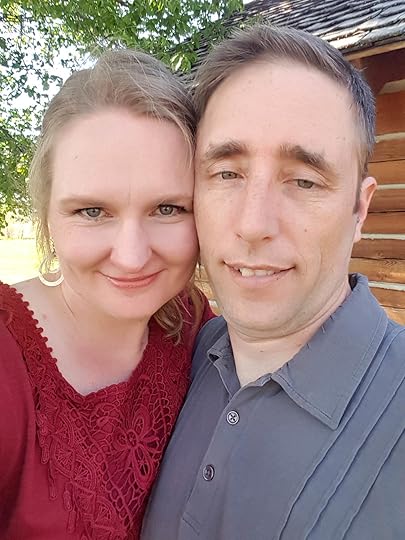
Two lovebirds on our 17th anniversary.

What sexy looks like.
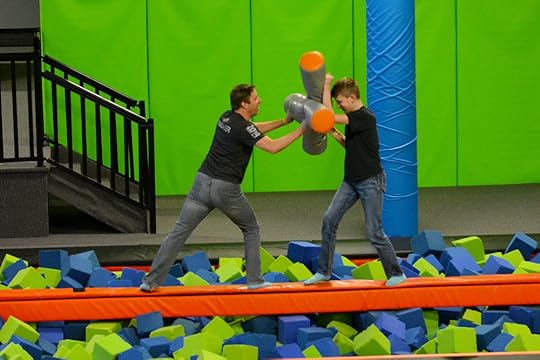
Showing Jude how it's done.

Hanging out at Jabin's soccer game.

Showing the kiddo how to jetski.
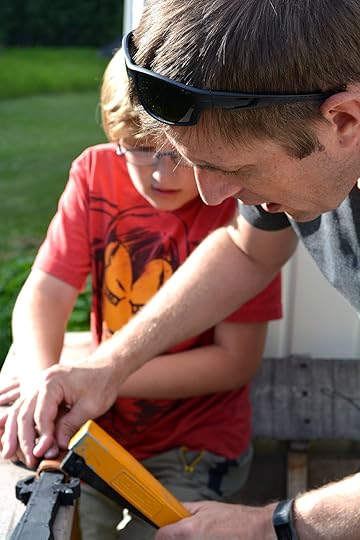
Father-son craft time: Jason helped the boys (and a few other kids, too) make their own wooden swords this summer, complete with leather-wrapped handles.
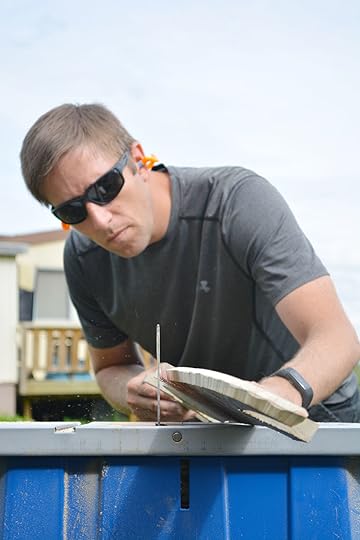
Concentrating on cutting the blade on a kid-designed sword.

Family hike on Father's Day. My hero and our boys.
September 21, 2017
Drawing the Line: 5 Loving Reasons to Say "No"
Two weeks ago, I was sent into an emotional tailspin by something that had nothing to do with me.
I kept asking myself, "Why does this bother me so much? How can I make it stop?"
I talked to my husband about it, he gave me some sage advice (because he's a wise guy--I say that in the best, most loving sense), and then he remembered a book he had in his stash that he thought might help me.
Boy, was he ever right. (See? Wise. Told you.)
A post shared by Talena Winters (@talenawinters) on Aug 28, 2017 at 8:23am PDT
He handed me the book Boundaries by Drs. Cloud and Townsend, and I read the thing in less than three days. Some of what was in there I already knew, and some of it was like the light going on for the first time. It was exactly what I needed.
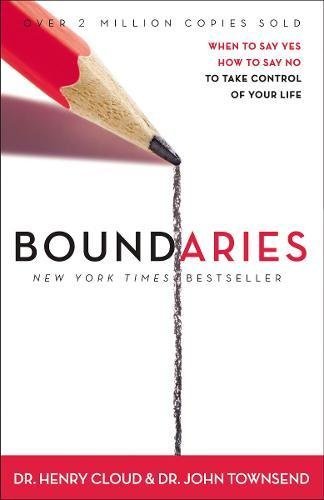
Boundaries: When to Say Yes, How to Say No, to Take Control of Your Life
By Henry Cloud, John Townsend
Before I go any further, I want to make something perfectly clear:
This book was written for a Christian audience.
I believe that non-Christians can benefit from this book, too, because I believe that the principles are universal as to how we are designed to operate as human beings (because obviously, I also believe God created us and that his principles work for everyone whether you believe it or not).
That being said, the authors are definitely speaking to someone who accepts the authority of Scripture, and in many cases, they assume that the reader is familiar with parables and stories in the Bible. References are often given for their examples, but not always. Sometimes, they just assume you know.
This single-minded audience focus is a good thing. Because within the Christian subculture, there are a lot of misconceptions about healthy boundaries, often reinforced by Scripture used out of context or without consideration of the principles meant to be illustrated within it. So to convince Christians who believe that letting their boundaries be violated (or that violating others' boundaries) is the Christian thing to do, the authors had to prove beyond a doubt that God disagrees. Heartily.
Now that that's out of the way, here are the top five lessons that I gleaned from this book. (There are many, many more applications of lessons on boundaries found in this book. These were the five I needed to hear most.)
Setting boundaries means taking control.This might seem like a no-brainer, but many of us have lives that are completely out of control, and it's because we don't know what we are or are not responsible for. This has been me at various points in the past, and it is something I am still learning. By necessity, I have had a crash course in setting boundaries over the last four years. As time goes on, I find that I'm "clearing the clutter"--not just from my house, but from my schedule, my priorities, and my career. I have less stress in my life than I have in years, possibly even ever, and it is because I have started to learn when to say no to both others and myself.Setting boundaries means releasing control.
Knowing where your limits are, and taking charge of the areas that pertain to you, means you can let go of the things that don't. You no longer need to micromanage your entire environment--which is a manifestation of fear of being out of control. I only have limited time and energy, and I don't want to spend it fearing what may or may not happen. So saying "no" to trying to control things which are impossible to control anyways means saying "yes" to peace, tranquility, and more time and energy doing things I love with people I love to be with (and who will love being with me more, since I'm not trying to control them).Setting boundaries means taking appropriate responsibility, and allowing others to do the same.
This was the big one for me--knowing what I was and was not responsible for in other people's lives (thus, the reason for my anxiety over something that didn't even affect me.) Even though I knew that I can only control myself, I was still letting myself get sucked into others' drama, or losing sleep over what other people may or may not do. Honestly, this is a lesson I have been learning by degrees for the last twenty years, but it was only with this recent crisis I saw how damaging my over-emotional involvement was to me and to them, and the book helped me understand why. Everyone's reasons are different. Read the book if you feel this is something you struggle with.Setting boundaries means loving others better.
In the book, the authors pointed out that resentment and anger are often the result of disappointed expectations. I used to feel resentful and guilty if I actually had to tell others "no" because I actually feared their anger and disappointment. In fact, even though I've set some pretty important boundaries over the last few years, I still felt guilty about it. After reading the book, I saw how setting those boundaries was the right thing to do, and actually allowed the people on the other side the opportunity to correct some destructive behaviours (if they existed, so it depended on the circumstance). My guilt stemmed from my early conditioning. Seeing how setting those boundaries was actually the most loving thing to do, even though it was difficult, has begun to set me free from that guilt. The simple and life-giving realization that their anger is their anger and does not need to affect me also helped. I can choose how I react, and if I do not let their anger give them power over me, they have none. And I'm happier. Also, when I choose to do something for someone, it is from a joyful heart instead of a resentful one.Setting boundaries means loving myself better.
All of these points are intertwined, because obviously I've already talked about how boundaries help you be happier and healthier. But this one is also meant on a more personal level--setting boundaries with yourself. This includes saying "no" to things that are harmful for you, such as food, people, and activities. For me lately, it's even gone as far as saying "no" to the ways I pressure myself through my environment--clothes that no longer fit, projects I don't really want to finish, decor that clutters instead of calms. I'm learning to say "no" to all sorts of things that I don't need in my life. And every time I let something go (which I was probably only holding onto out of fear, anyway), I feel lighter.
Setting boundaries, and maintaining them, is the loving thing to do. In fact, it is the only loving thing to do.
God is a god of boundaries. He maintains some pretty strong boundaries with us, and since he IS love, it holds that if we are to truly love, we will set and respect boundaries, too.
It is not loving to "turn the other cheek" out of fear or because one is being manipulated. When Jesus advocated doing that, it was as a conscious decision to be proactive in love rather than react in fear--to give of yourself by choice and to maintain control of your own emotions. "Perfect love casts out fear." And when one knows where your own boundaries are, you can finally, truthfully be a "cheerful giver"--of your time, talents, and affections. Because for the first time, the choice is yours.
What about you? Where do you struggle with knowing how to draw the line? Where have you had victories and why?
I love hearing from you! Please comment below. I answer every comment I receive.
May you approach this day with love, gratitude, and self-control, friend.
September 19, 2017
Melissa Keaster: Writing from the Ashes
A couple of years ago, God brought an amazing lady into my life. I was early in the process of grieving the loss of my son, and she had just been miraculously healed from a chronic, debilitating disease. We were both writing books that dealt with the subjects of sexual abuse and human trafficking. And we very quickly discovered that we both loved the Lord and had a passion for helping the helpless.
In May, Melissa published that book, the fantasy novel Eleora (which I reviewed here.) And while the book is really, really good, just wait until you hear her personal story!
Melissa's words have inspired me again and again. Today, it is my pleasure to host her for my "People Who Inspire Me" feature. I pray you are as blessed by her story as I have been.
Take it away, Melissa!
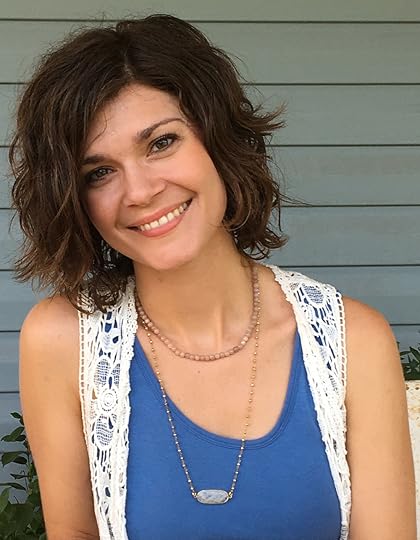
Melissa Keaster, author of Eleora
If I could sum myself up in a single adjective, I think the word I would choose is “passion.” Whatever my hand finds to do, I do it with all my might (Ecclesiastes 9:10), often exhausting myself into mild depression.
As a child, whatever I was pursuing at the moment is what I wanted to do for the rest of my life.
I always loved school, and one day I would become a teacher. The year I discovered Chopin, I planned to become a concert pianist. Emily Dickinson inspired me to become a poet. Laura Ingalls Wilder, a writer. Meg Ryan, an actress. Mother Teresa, a missionary. Joan of Arc, a warrior. Disney princesses, a singer. Michael Jordan, a professional basketball player. Beth Moore, a lady preacher—though I had to keep that one quiet, growing up in a Southern Baptist church and all.
I was a small town girl with big dreams.
At one time or another, I showed real potential in all of these areas, but time combined with life experiences and a greater, steadier passion for Jesus focused my desire for greatness.
The one thing I never planned on was getting sick.
If anything, I was going to take care of my husband, who had battled Crohn’s Disease for 13 years when we married. But life never goes as planned—especially if you’re a born idealist like me.
My body began to turn on me the year I married. I had my first anaphylactic reaction to food. Time passed, and my list of allergens grew, as did the severity of my reactions. I saw an allergist and began weekly allergy shots. I grew worse. I had my son and worsened again. I gave birth to my daughter, and what was left of my health shattered.
During my decline, I’d pursued several passions. I graduated at the top of my university class with a degree in music education and opened an at-home studio, teaching piano and voice lessons. I performed in several operas and musicals, often in a lead role. I wrote my first novel. (Never mind that it was terrible.) I became a mother, which was the greatest dream of all.
And then I lost nearly everything.
My life became one long emergency with the background noise of chronic pain, swelling, weakness, and fatigue. Allergic swelling and tissue damage stole my voice. Arthritis and fibromyalgia made playing the piano miserable. Fatigue and an impossible list of allergens made motherhood difficult beyond description. I became a shut-in who spent hours in bed to save energy to cook specialized meals for myself. Nearly all of my energy went into survival.
But God was there, and praise Him—he’d left me with an amazing support system. Because of this, I not only survived, but I learned how to thrive in the place I found myself.
The Enemy came to steal, kill, and destroy my passion, but God flipped the switch on the devil’s own scheme. The thing that was meant to keep me down helped me to focus on the essentials.
— Melissa Keaster
I clung to God with an unprecedented urgency. I knew in my bones that relationship with the Father was a very real matter of life and death for me. As I leaned on Him, my passion was restored.
I was determined that my illness would not steal my joy but that it would be a classroom for joy’s cultivation. I stopped focusing on what I couldn’t do and discovered what I had.
Friend, I was truly blessed, right in the midst of the hard. A lens of gratitude reshaped the way I saw the world and my own situation. And so I learned to boldly bring my small basket of fish and bread to Jesus day after day and watch to see what he would do with it.
He enriched my relationships with the people closest to me. Illness of this magnitude often tears families apart. By some miracle, my family bonded. I learned to live simply with contentment without being lazy. For a sick girl, I worked hard in the kitchen, providing nutritious meals for myself and my family. I read to my children when I couldn’t do much else. I even entertained guests from time to time.
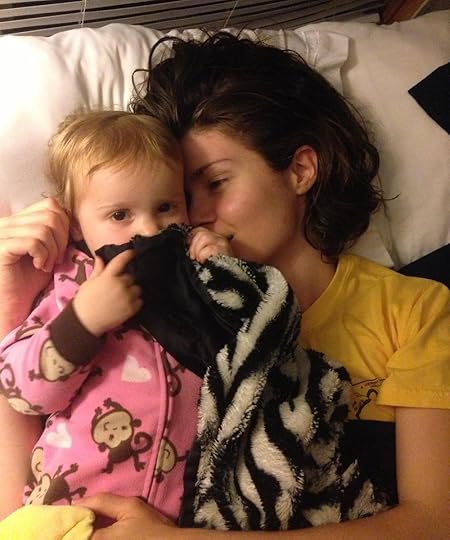
Melissa and her daughter.
I wrote.
I wrote blog posts, journal entries, Facebook posts, naughty poems to my husband, and letters of encouragement to sick friends. I jotted down instructions for my funeral. Just in case.
In 2013, God gave me an idea for a story. I wrote the story and realized it needed to be a novel. I was too unstable at the time to write every day, but I filled a speckled notebook with character sketches, backstory, maps, and plot ideas.
A year later, after a visit to Mayo Clinic, a subsequent diagnosis of mast cell activation syndrome (an incurable immunological condition), and a treatment plan, I began the first draft of what would become my novel, Eleora.
Daily writing was so life-giving. I had the time of my life. Not that it came easily. Some days, I could only write a half hour before the pain became too much. Some days I wrote lying down. Some days I couldn’t write at all because I would have a severe allergic reaction that took everything out of me. I had to write around self-care, the kids’ nap schedules and the time I needed to prepare meals for everyone.
Throughout the process, I studied the art of writing and the mechanics of storytelling. I wrote and rewrote and rewrote some more. During my daily detox bath, I prayed, bringing real life problems and story problems before the Lord. He provided solutions for them all. In His way. In His time.
In July 2015, I finished the third draft and sent it off to beta readers. God then began sending me a message. It came again and again—“Seek out community.”
At first, I argued. “God, have you forgotten that people literally make me sick?” He hadn’t. So I trusted Him. I put on two breathing masks and started attending church with my family again.

Mom in a mask.
I got sick every Sunday and then would have to spend the following day in bed. But I did it because I didn’t know how else to obey the command God had given.
After three months of reacting to perfumes, lotions, and the air conditioner week after week, I decided to check into a prayer group that once met on Sunday mornings during service. They no longer met on Sunday morning, I found out, but the man who began the group invited me to a meeting at the home of someone he knew. I couldn’t believe the “yes” that escaped my mouth.
What happened from there is a story all of its own. I’ll summarize—
These people loved me from the moment they met me. They prayed for me, took me in, and taught me more about God. They ministered to me, and several months later I was completely healed of my incurable condition.
These people loved me from the moment they met me. They prayed for me, took me in, and taught me more about God. They ministered to me, and several months later I was completely healed of my incurable condition.
— Melissa Keaster
Along the way, they called out and awoke the passions lying dormant inside of me. They nurtured me. Because of them, I am well and enjoying motherhood in a way I never have before.
I’m teaching as a homeschool mom and tutor for Classical Conversations, putting both my love of learning and musical skills to good use. I have a piano student. I’m no longer allergic to exercise, so basketball isn’t entirely out of the question.
I’ve returned to the mission field, both locally and internationally. I lead worship twice a month, using my gifts and skills in piano and voice to bring people into the presence of God. I write songs. I help lead our local prayer ministry, which was vital to my healing.
These people totally support me becoming a lady preacher and give me opportunities to teach. They helped me discover my warrior spirit and trained me to fight for the freedom of others. They showed me how serving others is greatness.
While I believe that I would have eventually published Eleora one way or another, they have made the process sweeter and richer through their friendship, prayers, and support.
So you see, everything was redeemed.
The Enemy came to steal, kill, and destroy my passion, but God flipped the switch on the devil’s own scheme. The thing that was meant to keep me down helped me to focus on the essentials. Through the trial, God trained me to persevere. To obey the command when it doesn’t make sense. To go for things beyond my reach and ability. What I thought was the death of my dreams was only a death to striving. Now I’m free to enjoy what has been given rather than trying to earn what’s already mine.
Friend, I hope you realize that I’m not special—at least not “special” in the sense that God did something for me that he won’t do for you. I hope you realize that what God did for me he is able and willing to do for you, your neighbor, your mom, and your best friend’s uncle’s cousin.
He’s probably just waiting for you to ask.
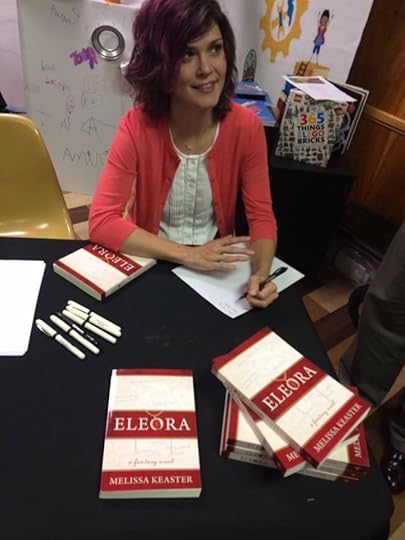
What redemption looks like: Melissa signing copies of her book. In public. Without a mask.
Thank you, Melissa! If you haven't had a chance to pick up a copy of her book yet, you can find more information on that here: https://www.melissakeaster.com/.
And if you'd like more details about how she was healed from MCAS, you can read her testimony about that here: https://www.melissakeaster.com/blog/2016/02/food-struggle-its-been-real-folks.html
Lastly, I am currently looking for Advanced Readers for Finding Heaven. That means you can read the book for free, but I ask that you leave a review on Amazon.com on or immediately after the release date of November 14. Please take a moment to check it out and consider if you could fit it into your schedule. ARC for Finding Heaven.
If you were blessed by Melissa's post, please leave a note for her in the comments, or check out her site and contact her from there.
Happy Tuesday, friend!
August 30, 2017
2-Minute Tutorial: Write a Good Book Review

Writing reviews is probably one of the very best ways you can help your favourite authors (besides buying their books). On sites like Amazon, once a book has a certain number of reviews the platform "rewards" it by showing it in the "Also bought" lists. Some readers and book newsletters won't even consider reading a book until it has 25, 50, or even 100 reviews. So your review really can make a difference!
However, what makes a good review? Here are the "3 Rs" of writing a good book review.
RateThe most helpful reviews are rated honestly, but with enough explanation for other readers to know why you rated it that way. Do you think it deserved 5 stars? Why? Give details. Only 1 or 2 stars? Great. Why did you rate it so low? Be as specific as possible.
Giving specifics like "the plot moved too slowly" or "I thought the characters were boring/well drawn" gives not only other potential readers enough information to see if they might feel the same way, but also helps the author to see weaknesses (and strengths!) in their own writing, or why their book just didn't appeal to you.
Maybe you like faster-paced books and were expecting a suspense thriller but ended up with a dramatic women's fiction so gave it only two stars. Someone else who enjoys a slowly unfolding plot may look at your review and think, "Perfect!" And the author will learn that something in their presentation misrepresented the book.
If you feel like you must rate it poorly but explain why, you will also help the author avoid more low ratings from those with similar tastes as you.
RelateSaying "I loved it!" is nice, but it would be more helpful to tell us why you felt that way. I've seen 3-star reviews that still made me want to read the book because the reviewer was specific. More along the lines of "The pacing kept the book moving, and I loved the fun and interesting historical details. The main character is deliciously flawed, and someone I could totally relate to. She reminded me of So-and-so from Another Book. However, I was disappointed that there was ___ in the book, which is something I don't enjoy."
On a similar note, try to use interesting words--these are much more "quotable" than simply saying "It was great!" Choose words like "riveting, page-turning, fast-paced, heart-stopping, masterful storytelling" etc., for better description and quote potential. These "quotable reviews" are what authors love to put on their book landing pages, liner notes, and blurbs, and are one more way to help your favourite author sell their book.
RereadMake sure you read your review several times before you post it. Check for:
An interesting title (at least somewhat). I like to use a phrase like, "I couldn't put it down" or a description like "Enchanting and heartwarming."Spelling and punctuation errorsMakes sense/flows well. Reading it aloud is the easiest way to check this one.And that's it! Post it knowing that you helped other readers and the author, too.
Do you have something to add? Please leave me a comment below. I love hearing from my readers, and updating this article will take, well, less than two minutes. :-)
(This post inspired by an article by author Adam Dreece. Check out his site for a great collection of "Steampunk meets Fairytale" fantasies.)
August 29, 2017
Enjoying the Little Moments
First of all, if you are reading this through your email (because you have a blog subscription--see link or right sidebar to subscribe if you never want to miss a post), this may look a little different. That's because I just changed over my blog feed delivery service from Feedburner (which has always been a little jinky) to Mailchimp. I'm hoping that the end result for you will be a more beautiful reading experience. However, you will still not get videos or other widgets that I embed in the post, so if you're ever reading and go, "I think there's something missing here," try "visiting the site" (or whatever terminology they use) to get the full content.
That being said, since I just did it last night, I have no idea if I did it right and if it's actually going to work. This post is the test.

My Grandma Ivis painted several of these in the early nineties. This one is now framed and up on her wall.
Yesterday morning, I received an automated phone message from my kid's school division superintendent saying that, due to the renovations at the school, my kids' "back in class" day would be delayed by a week, from this Friday to the next one. I got a little distraught at that news. Yeah, I whined. I'm not proud of that. I might be about to do it again. :-)
I love my kids, y'all. They are fantastic boys, and easy to have around. But I tell ya, when I had the house to myself for a blissful, quiet hour on Saturday afternoon (only the second time that's happened all summer), I felt like I'd just had a chance to get grounded. The kitchen got cleaned up--and I mean, actually cleaned up--and the house was tidy for at least fifteen minutes (by the time I finished) before my family came home and started messing it up again. It was like a little mini-vacation for me.
See, I have discovered that I have a very difficult time concentrating on writing when I know my house is in disarray. I also struggle to write when there are people around, which is why I'm a "write-at-home-not-a-coffee-shop" type of person. The only reason I'm able to write right now is because I've closed my office door and the only distraction I really have is the occasional kitten curious about the noise my fingers are making.
( . . . She said, right before multiple interruptions by the child who wants to repaint his room next summer and must discuss all the ideas right now. No, Jude, you may not paint your room black.)
So that means that, despite my best intentions to keep my "work" during daylight hours so I can spend evenings with my kids and husband, any writing I've done this summer (and there hasn't been a lot--mostly editing, and re-editing, and lots of re-reading of Finding Heaven) has been late at night. I've gotten time in with my kids during the day, but it's been tougher for my hubby and I to find quality time together.
So, as much as I never wanted to be one of "those" moms, I'm really looking forward to my kids being back in school.
A post shared by Talena Winters (@talenawinters) on Aug 26, 2017 at 5:26pm PDT
But enough whining. Despite the total disruption to my routine (which I begrudgingly admit is probably good for me), we've made some great memories this summer and I got to spend a lot of time with my kids, my grandma (who now lives in my town), and also letting my kids have friends over, something I haven't had energy for the last two summers.
And honestly, since losing Levi, I put a much higher priority on that time with my kids and husband than anything else. It's pretty easy to ignore the "to-do" list most of the time and just bump stuff to the next day--it'll still be there, after all. I'm going back to my old mantra of "slow progress is still progress," and taking time to enjoy the important things in life while my other boys are still at home.
Now, I'm going to see how much of my super-to-do list (you know, the one that has accumulated from all that bumping) that I had intended to start on Friday can be delayed for another week so I can enjoy a few more "little moments" with my kids.
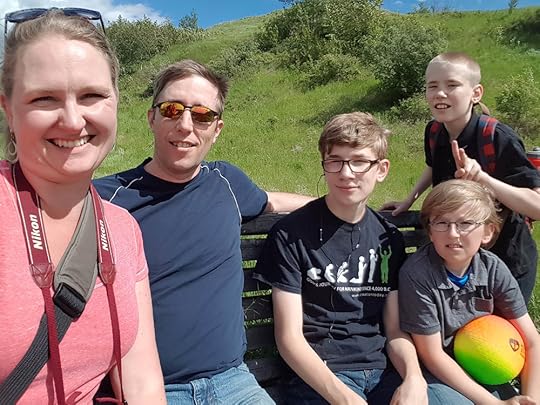
Family selfie on our Father's Day hike.
And maybe some big ones.
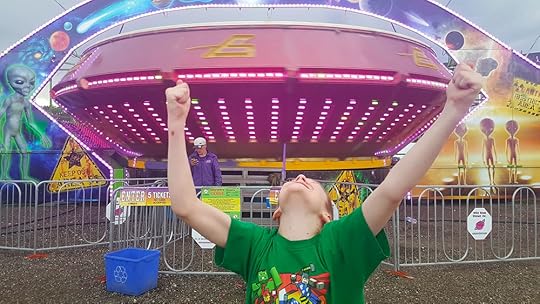
Noah after conquering the ride at the carnival which he had been most afraid to try, and which then became his favourite.
Happy last-week-of-summer, friend! What has been your favourite memory this summer?
August 24, 2017
Could Your Story Change the World?
I had my first kiss on the night of my prom, with a boy I asked because no one at school asked me. I didn't know him, but my father suggested him (!) as he was the son of a family friend and reputed to be a "good kid" and a good dancer--and I was determined that I would get to dance with someone at my prom. He was a year or two older (still is, actually ;-) ), but neither of us were previously experienced in the relationship department.
This somewhat inauspicious beginning should probably have been a sign that our "relationship" was fated not to be. From that first awful kiss (the movies never tell you that if neither of you know what you're doing, your first kiss will probably suck--literally) to the trip to West Edmonton Mall wherein I "snuck" into a bar with him a full two months before my eighteenth birthday (not to drink--just to say I'd been in a bar!), it was three whole weeks of trying new things and trying out the feeling of "dating" someone--before it sputtered out in a complete lack of chemistry.
However, somewhere in those three weeks, we had a movie date. And the movie we went to see was the newly released blockbuster film Braveheart.
I remember walking out of the theatre in astonishment that three hours had passed on the clock--how could it possibly have been that long? My makeup was probably running, and I was having a difficult time processing the emotional impact of the film. (Especially as my date and I did not have communication styles that jived well.) The relationship may have ended soon afterward, but I would rewatch Braveheart many times over the years, and even read the book the movie was based on.
After all, who wouldn't get stirred by Mel Gibson painted blue and delivering an impassioned speech about freedom? Not to mention that it was William Wallace's story of unjustly-destroyed love (in the film--no idea about real history) that sparked masses of Scots to follow him in the fight for independence.
To me, this was a moving story of a man fighting to right injustice and fight oppression. With no Scottish background of my own (that I know of--but I wouldn't bet money on that or anything), calling it "a great movie" was as far as the impact went for me.
Not so long ago, my eleven-year-old paraphrased the famous "They shall not take our freedom" speech in reference to cookies or something equally life-changing. I kind of dropped my jaw and stared at him in amazement.
"Do you even know what that's from?" I asked, knowing that there was no way in this grasshopper-infested paradise that his father nor I had let him watch the movie yet. Had he watched it at a friend's house? And the real question--which mother am I going to have to have a word with?
"Is it, like, 300 or something?" he said.
Whew. "No, it's from Braveheart."
"Oh."
He hasn't even seen the film, and he knows the speech. I'd say that it made an impact on our culture.
And when I just googled the cultural impact of the film, I discovered that the impact on Scotland has been even more profound. Despite the many historical inaccuracies of the film, according to this article, it sparked a renewal of Scottish Nationalism that has resulted in the country nearly voting itself into independence from England not once, but twice, since its release in 1995.
I am pretty sure that reshaping the politics of the modern United Kingdom was nowhere on the agenda of Randall Wallace (the novelist and screenwriter of Braveheart), Mel Gibson (who starred in and directed the movie), nor anyone else on the cast and crew of the film. All they wanted to do was to tell a good story. Oh, and make money.
I believe that, whether the message is intentional or not, every story can have an impact on the reader—and, in fact, all the best stories do.
A story impacting a culture in a major way is not new. From Joseph (of "coloured coat" fame) to Ghandi, Jesus to Mohammed, Homer to Shakespeare, it is the stories we share that bind us--or break us--as a culture. That is why myth is so powerful.
Stories introduce new ideas and concepts in such a way that we are changed without even realizing we have changed. We could go into a theatre firmly ensconced in our sense of the world and come out questioning our views on anything from the food we eat (Supersize Me), to the forces that shape our cultures (JFK, Snowpiercer), to whether wearing diamonds is even moral (Blood Diamond), to the very fabric of reality as we know it (The Matrix) or our concepts of God (The Shack).
We often hide the parts of us that make us seem vulnerable or less than perfect. But it is those parts of ourselves that have the most power to help and influence others’ lives for the better.
Earlier this month, I attended a writing conference wherein I could have had a thoughtful and intense discussion on the impact of story on culture with any one of hundreds of writers who take the power of their pen very seriously.
Or who don't. Because some of them just want to have fun and tell a great story.
And there is nothing wrong with that. In fact, I think most writers want to do some of both. But I personally believe that, whether the message is intentional or not, every story can have an impact on the reader--and, in fact, all the best stories do.
The makers of Big Bang Theory probably didn't intend to spark a wave of interest in scientific fields when they developed their concept of writing a sitcom about geeks--they only wanted to bring people joy. (And make money. Let's not forget that. It's hard to survive on joy vapours and laughs.) Yet shows like BBT have propelled "geek chic" into the mainstream culture, and are also partly responsible for an increased number of people pursuing fields in science (according to the special featurette included with the BBT Season 10 DVDs). Quite by accident, they have managed to make being a geek cool.
Conversely, some stories are told with the deliberate purpose of changing your mind. Philadelphia, An Inconvenient Truth, and One Flew Over the Cuckoo's Nest all opened conversations that had tremendous cultural impact, and some of those conversations are still going on.
This is all well and good, but how does that relate to you and me?
My story about a first kiss and three hours in a theatre that passed almost as quickly as the relationship I was in might be a fun short before the main event, but no one is going to make that into a book or a movie that's going to change the world.
However, that was a small, nearly insignificant blip on the radar of my life, despite the hype I had built around that first kiss in my mind. Sorry, Teenage Me--it didn't revolutionize my view of the world. It changed me a little--but the things that changed me a lot, like the losses I've gone through and the hard lessons I've had to learn--those are the things that others actually want to hear about. Those are the things that will impact their lives, too.
It is often seeing that we are not alone in what we face that inspires us to keep trying, keep putting one foot in front of the other toward our goal.
It seems kind of backwards, doesn't it? We often hide the parts of us that make us seem vulnerable or less than perfect. But it is those parts of ourselves that have the most power to help and influence others' lives for the better.
One of my friends recently publicly opened up about her lifelong struggle with bipolar disorder. She has often felt like she has battled it alone and that there is a great deal of stigma and misunderstanding about the condition, and wants to spark a discussion and educate people so that others don't have to walk the same lonely road.
Another friend knows that she can help people trapped in abusive marriages--because she was in one. Yet another friend constantly talks about her struggles with food, her weight, and her health as she hops back on the exercise machine.
All of these people share their stories to both be an encouragement and to be encouraged. There is something so attractive about authenticity, and it is often seeing that we are not alone in what we face that inspires us to keep trying, keep putting one foot in front of the other toward our goal.
You might think your story isn't that special, that you have nothing to give. But if you think about it, you'll probably realize that you have already learned some life lessons that others would benefit from. And if not, if you have not yet experienced a loss or obstacle that you had to fight to overcome, give it time. No one is exempt, so you'll have an "inspirational story" of your own at some point. Just remember that, when it happens, the lessons you learn are not meant to be hoarded but to be shared.
Just like William Wallace, who lost the woman he loved and led his people to freedom, you can let your loss be distilled through you and your grief and become a blessing to others walking the path you walked.
Through your pain, you can be a blessing to others. Weird, right?
To answer the question I asked in my title, Yes. Whoever you are, and whatever your story is, your story can change the world. All you have to do is tell it.

Photo copyright olgaaltunina / 123RF Stock Photo.
August 16, 2017
What Are You Known For?
This photo I took last week on my way down to Calgary for a writer's conference inspired some thoughts on being our best selves today. I posted it to Instagram, but I wanted to record it here for posterity.

I love the colours!
This building is one of the "famous" landmarks one sees on the highway between Valleyview and Peace River. It is probably one of the most photographed buildings in the region. There is just something so beautiful and iconic about a brilliant red-and-white Canadian flag located between golden fields and brilliant blue skies. Not only are the colours stunning, but the symbolism is gorgeous, too.
We are a land known the world over for our peacekeeping role. That doesn't mean we don't have violence in our country's past, because we certainly do, and we are not proud of it. But most Canadians are VERY proud that the world sees us as nice, open, welcoming people who would rather smooth a situation over than antagonize it.
Well, those qualities may define us as a culture, but there are certainly individuals who fall far short of that ideal. Because really, we are all still people, and we are all on our own journey. And frankly, there are times that even the best of us would rather just stay in our protected little bubble and tell the rest of the world to deal with their own problems, for crying out loud, just leave us alone.
But that doesn't mean we have to be like that all the time. Or even most of it.
When people think of me (not just my country, but me as an individual), I want them to think of someone loving and open, who will accept them with all their virtues and flaws as a complete package, and love them as they are. I want them to see me as someone they can turn to when they need a listening ear, who will not just let them destructively vent but who will encourage them to see the best in those around them, too, and look for solutions to their problems. Who will help them heal instead of let them stagnate.
Honestly, this is more because of my faith than my country's values, but my history as a Canadian plays a role.
When you think of where you are in life, what do you want to be known for? And do you think you already are?
May you choose to be the person you wish you were today. May you be your best self--both for other's sake, and for your own.
Be fabulous. Be you.
A post shared by Talena Winters (@talenawinters) on Aug 16, 2017 at 11:34am PDT
August 8, 2017
Mary DeMuth: Beauty in the Broken
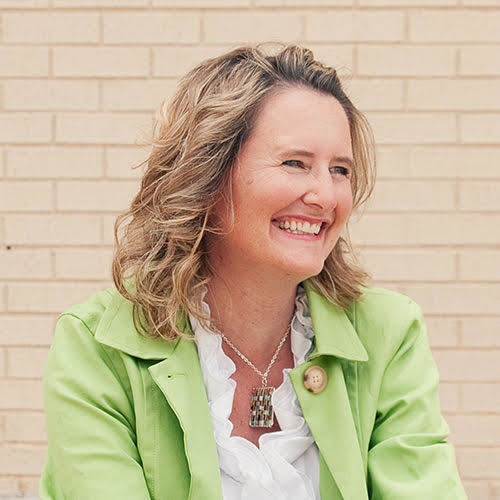
Mary DeMuth. Photo by Tina Miller Howard. https://www.facebook.com/spaghettipie
While I was researching Finding Heaven, I read a lot of books. Some of them were books meant to help those who have suffered abuse. And some of them were testimonials or memoirs by people who had.
One such book was Thin Places by Mary DeMuth. As I read it, I was like, “If this woman and I were in the same town, we could be friends.” I tweeted about the book, and Mary and I started up a virtual acquaintance.
Thanks! I'm reading your story and see we have walked some similar paths, too. Was thinking we could have a good talk over tea.
— Talena Winters (@TalenaWinters) July 20, 2016
But new truths are being imparted. Love it when I read a book for research and God uses it to teach me for myself.
— Talena Winters (@TalenaWinters) July 20, 2016
(I previously mentioned this book in a post about achieving dreams.)
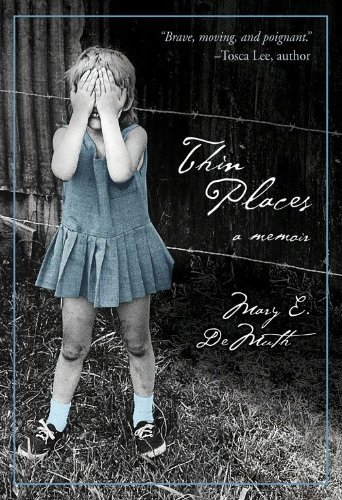
Thin Places: A Memoir
By Mary E DeMuth
In her book, Mary was incredibly vulnerable about her background in an unsafe broken home with prevalent drugs and partying, the sexual abuse she suffered at the hands of some neighbourhood boys when she was five years old, her struggle with addictions and suicidal thoughts, and the ways that God has used all of these wounds as “thin places” to reach into her life.
On the first page of the book, she defines “thin places” as “snatches of holy ground, tucked into the corners of our world, where, if we pay very close attention, we might just catch a glimpse of eternity.”
As I read the book, I was like, “Yes. That.” Over and over again, I recognized that God had used Mary’s wounds to teach her many of the same lessons he was in the process of teaching me—some of which became much clearer because I read the book.
The more I got to know Mary, the more I wished we could have that tea. She is such a beautiful example of how God can take the most broken of us and create something extremely beautiful. His love shines through her like light through a stained glass window.
Her biography on Facebook begins, “If you met Mary today, her joy would confuse you.” I love that. After all that Mary has been through, the fact that she is known by her joy (not surprising if you read even one article she has written) is a testimony to the healing power of Christ.
As she says in her book, “He redeems my messes. Cleans them up. Polishes them until they shine so bright the reflection of Jesus smiles back.”
Reflecting JesusI was hoping to interview Mary as part of this “people who inspire me” series, but unfortunately, her very busy schedule did not allow it. However, she gave me permission to introduce her to you using work she has already published. As I’ve pondered how to do this, I realized that I was not sure how—when I write features on people for Move Up magazine, I always have the raw material of an interview to work from. In this case, I have to draw primarily on Mary’s articles that I’ve read or the one book (of the more than thirty she’s written).
So, I beg your forgiveness for frequently injecting my own experience into an article about someone else. But after all, the reason I’m writing it is because Mary’s words changed me. God used them as a mirror to show me parts of myself I had always chosen to overlook before, but about which he said, “We need to deal with these now.”
Thin places are snatches of holy ground, tucked into the corners of our world, where, if we pay very close attention, we might just catch a glimpse of eternity.
— Mary DeMuth
For instance, in Thin Places, Mary tells the story of the time a friend told her how her constant industry had inspired the friend to maintain more activity in her own life (such as greater efficiency in housework). Mary received the complement with mixed feelings.
“I am not so sure I’m happy with her words,” Mary said. “She means them kindly, but they echo in my head like truth. I cannot stop. I must always work. I must always prove that I am worthy to take up space on earth.”
Those words hit me hard. Anyone who has known me for any length of time knows that I had a difficult time sitting and doing nothing. That is, in large part, why I took up fibre crafts—I took up crocheting while dating a guy whose parents were a three-hour drive away in order to stay awake on the trip. Inactivity put me to sleep. I even had difficulty with the activity of only driving— for so many years, it seemed like a completely unproductive waste of time.
I soon discovered that I didn’t care much for crocheting, but knitting grabbed hold and I loved it. And so, for the next sixteen years, I would rarely sit and watch TV or even visit someone without yarn and needles in my hand.
… Until this year, when we took a week-long family vacation and I didn’t knit a stitch.
It’s not that I don’t like knitting anymore. I do. But over the last two years, God has been bringing me to a place where I’m okay with stillness. I’m okay with doing only one thing, and I’m okay that sometimes that one thing is nothing. For the first time in my life, I’m no longer driven to achieve something every moment of the day. And it’s because I recognized myself in Mary’s words.
My activity wasn’t a fear of boredom. It was an effort to prove my own value to those around me—and myself. When I recognized that, and (through a different book I read) realized who I was trying to impress, God brought me to a place where I no longer needed to prove my worth in the eyes of others. He is the one whose approval I need, and I have it—not because of anything I did or could do, but because I am his daughter through the redemptive work of Christ.
I am now much more content to just be.
He redeems my messes. Cleans them up. Polishes them until they shine so bright the reflection of Jesus smiles back.
— Mary DeMuth
Mary’s history is one rife with tragedy—being a child of three divorces, having a father who died when she was young, and having her personal worth stolen by two teenage boys through the neglect of a babysitter who didn’t really care, to name only a few. Yet God took her life and restored it in such a way that every word she writes shows others how much he loves them—which is exactly the way she wants it.
Mary is now a speaker and writer. She hosts The Restory Show, a podcast that interviews people whose brokenness has been used by God in one way or another (and on which, I’m thrilled to say, I will be a guest at some point this month). She spends her life encouraging people to see beyond the shame of their brokenness and see the beauty that God can make of it.
Mary already knows what the loss of my son (and more) taught me—that it is through our woundedness that we can most easily change to become more like Christ. Loss makes us pliable, shakes our foundations deeply enough that he can reform us into something new, someone more like him. And it is the profound insights she has gained through her many losses that she bleeds onto the pages of Thin Places.
“I live in the midst of holy moments, yet only in retrospect do I really see them,” she says in the book. “I claw at the seams of life, questioning God’s ways, seldom realizing that if I’d stop clawing, I would capture new glimpses of him through the thin places. God woos me from behind the veil through tragedies, beauties, surprises, simplicities, and snatches of my life I might overlook.”
I encourage you to check out her website (www.marydemuth.com), listen to her podcast, and by all means, read her book. I pray that you will be as blessed by her words as I was.
(This song, "Beautiful Things" by Gungor, is part of the soundtrack playlist for Finding Heaven. See the whole list on the book page.)
Speaking of Finding Heaven, I have exciting news--the launch date is set for November 14.
At the moment, the book has been edited and is with the formatter. Also, the digital version is available for ARC readers--for free!
What does that mean? It means that I will give you a free digital copy to read as long as you promise to leave a review on Amazon.com on the day of the launch, or shortly thereafter. Interested?
Learn More
Happy Tuesday, friend! May you find beauty in the thin places of your life today.
August 6, 2017
It's All About Love
As I type this, I'm sitting in my wood shed, hoping that my quiet, non-threatening presence will entice four little kittens to come out, come out, wherever they are and let me catch them so they can be tamed.
Their mama is feral, and managed to escape our wild barn cat "get-em-fixed roundup" last fall, thus the reason we now have a new batch of wild ones to tame. Even though we just discovered them last Sunday, and they can't be more than three or four weeks old, in a single week they have already learned to fear us--not from mishandling, but from their mother's behaviour.

Look what I found! (Taken last Sunday. And #isuckatselfies.)
Last night, Noah caught one of the five kittens. Knowing that it was now all-or-nothing to get this family tamed, I put out the live animal trap and, mercifully, caught the mama instead of one of our other six adult cats. Since then, I have made multiple attempts to sneak up behind the other little ones when I see them out, but I have to walk across the entire yard from the house--plenty of time for the little sweetums to sneak beneath the floorboards of the shed (which are only pallets, after all).
They don't know that I'm trying to help--I'm actually trying to reunite them with their mama. They are reacting out of a deep-seated preservation instinct that says "FEAR THE UNKNOWN". Neither does the mama trust us, despite the fact that we've fed her for two years now. That's what happens when you don't catch them young and tame them.
So here I sit on a Sunday morning, on a wooden floor instead of a wooden pew, pondering about how often I'm like these cats with my Heavenly Father.
When I was a teenager, I saw the world as very black and white. Every decision I made had undertones of moral significance--but the filter I compared them to was a list of "shoulds" and "shouldn'ts". Because I, like these kittens, feared the unknown, and rules offered security.
I don't know if it was because I was the firstborn, or from a fairly emotionally chaotic but disciplinarily strict household, or a combination of all of the above, being a strict rule-follower has always been my fallback position. Rules keep me safe. Rules define right and wrong. Rule-following brought commendation from those in authority, while breaking them brought immediate repercussions, not least of which was the guilt permeating my own soul.
As I got older, and changed church denominations, and gained a little bit of life experience, I came to understand that the rules--while they have their place--are not what should be the defining parameters of our lives. They are important, but they do not exist for their own justification. They are meant to guide us in living out the principles behind them.
And when it comes to the rules in the Bible, that principle is love.
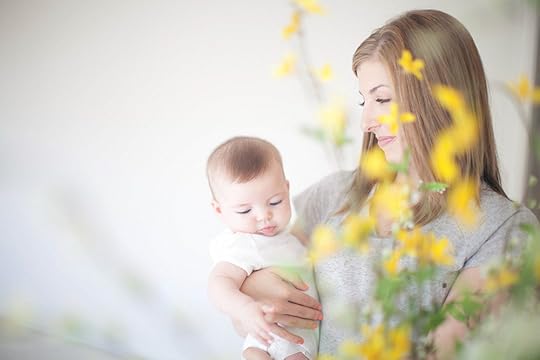
Photo courtesy of Lightstock.com.
When I became a parent, I began to understand that my insight and growth in this area is the natural progression of maturity--small children don't have the life experience to understand the principles behind the rules. They only understand "Do" and "Don't". As they collect experiences, they begin to understand the reasons why the rules exist--"Don't touch, you will get burned because it's hot." "Do use a spoon, it's much tidier and more efficient that way."
The most difficult principles to learn are the ones involving ethics and which contradict our self-serving instincts--"Do share, because that is the loving thing to do."
The loving thing.
Why is this "loving" thing so difficult to learn? Why is it so hard to put others before ourselves, to see from another's point of view? Why is it so difficult to trust that the Father has not abandoned us when we are in the middle of a difficult experience? Why do we so quickly sit in judgement of those who behave in ways we don't understand?
We like to think that we humans are smarter than your average bear--or kitten. But as it turns out, FEAR OF THE UNKNOWN rules us, too. Because when the fur hits the fan, our first instinct is still to raise our hackles and run. It is incredibly difficult to step back and think for a moment and say, "What is the loving thing to do?"
Losing my son has changed me in many ways, but one of the most profound understandings I have come to is how far, deep, wide, and high is the love of Christ, and to what crazy lengths our Heavenly Father went to show it to us--and still goes to. My son died by accident. I could never have willingly given him up, no matter what the reason.
Who then is the one who condemns? No one. Christ Jesus who died—more than that, who was raised to life—is at the right hand of God and is also interceding for us. Who shall separate us from the love of Christ? Shall trouble or hardship or persecution or famine or nakedness or danger or sword?
— Romans 8: 34-35 (NIV)
I used to look at the world through black-and-white glasses. But now, I have a whole new filter, and it is "What would Love do?"
In the Bible, it says that God is love, and that others will know that we are Christians because of the love they see in us. But too often when we are confronted with a situation we don't understand or a person who sees things differently than we do, we are anything but loving. We set ourselves up as judge and jury over others' lives in an attempt to control everything (which is actually an expression of fear). Because love--true, sacrificial love--is risky. You could lose that person. Or they could hurt you deeply. Heck, they may not even love you back.
When you love, you can lose, big time. And every time you love, you are opening up to pain from the unknown.
But here's the thing, friend--if you read to the end of the Book, LOVE WINS.
And I'm not just talking about the epic battle between good and evil. Love wins on a smaller scale every time we choose it over fear.
Sure, there may seem to be losses along the way. But when you truly love someone, and choose to love even though you may be hurt, you win a victory of the soul. Because instead of trying to control your circumstances, you controlled your baser instincts of self-preservation. Because giving love is more rewarding than hoarding it. Because chances are that loving someone and thinking of their needs before your own is going to give you a much more fulfilling life than nursing a festering wound from that time you were hurt and swore never to let it happen again.
Because loving contributes to the world instead of taking from it.
No, in all these things we are more than conquerors through him who loved us. For I am convinced that neither death nor life, neither angels nor demons, neither the present nor the future, nor any powers, neither height nor depth, nor anything else in all creation, will be able to separate us from the love of God that is in Christ Jesus our Lord.
— Romans 8:37-39 (NIV)
This post is kind of rambly. And I've seen a few kittens, but they have not come near enough to touch. And now I have to go dig potatoes and make lunch.
So let me leave you with this thought--
It is always easier to take the low road--to react in fear instead of proact in love. And in the short term, doing so can seem like the smarter path.
But you and me, we weren't called to be in control of others or even our own circumstances. We were called to love. And thankfully, as Christians, we can rest assured that it's not our job to judge anyone, either. We are only supposed to share the good news and love God and others. That's it.
The rules are simple, really. Why do I keep making it so complicated?
All About Love
We've got CDs, tapes, and videos,
Radios and TV shows
Conferences, retreats, and seminars
We've got books and magazines to read on
Everything from A to Z
And a web to surf from anywhere we are
But I hope with all this information
Buzzing through our brains
That we will not let our hearts forget
The most important thing
Is love, love, love, love, love
It's all about love, love, love, love, love
Everything else comes down to this
Nothing any higher on the list than love
It's all about love
Now they're fighting in the Middle East
And they're fighting down on 7th street
And there are fights in my own house on given days
It's like something's lurking deep inside
That can't seem to be satisfied
But life was not meant to be lived this way
'Cause it's true for every man and woman,
Every boy and girl
That our only hope for living here
Together in this world
Is love, love, love, love, love
It's all about love, love, love, love, love
Everything else comes down to this
Nothing any higher on the list than love
This is the reason we were made
To know the love of our creator
And to give the love He's given us away
Yeah, the Maker and the Father
And the God of everything--
He says to love love love
He says love love love
Love love love
'Cause after all it's all about love
God says, love, love, love, love, love
It's all about love, love, love, love, love
Everything else comes down to this
Nothing any higher on the list than love
'Cause after all it's all about love
It's all about love, love, love, love, love
It's all about love, love, love, love, love
It's all about love, love, love, love, love
Songwriter: Steven Curtis Chapman
All About Love lyrics © Capitol Christian Music Group



